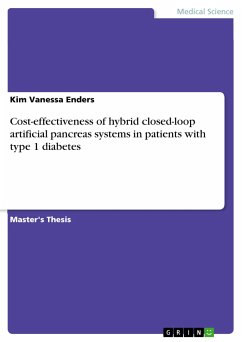Master's Thesis from the year 2022 in the subject Health - Digital Health Management, grade: 1.0, University College London, language: English, abstract: This paper is about the cost-effectiveness of hybrid closed-loop artificial pancreas systems in patients with type 1 diabetes. Advances in diabetes technology over the past decade have culminated in the commercialization of hybrid closed-loop (HCL) artificial pancreas systems, alleviating the onus of self-management in type 1 diabetes (T1D). Clinical effectiveness benefits over conventional systems are well-documented. However, no systematic review has been performed on the cost-effectiveness of HCL systems, even if health economic assessments are integral to guide policy decisions. To perform a systematic review, critical analysis, and narrative synthesis of available economic evaluations of HCL systems for T1D patients and upcoming cost-effectiveness studies within the research pipeline. A systematic search was conducted following the PRISMA 2020 guidelines in MEDLINE, Embase, and CENTRAL via Ovid in October 2021. A review of trial registries and grey literature, as well as reference list and forward citation search, complemented the search. Predefined eligibility criteria were used. Retrieved studies underwent CHEERS-based quality assessment. Data were subsequently extracted via a standardized data extraction form. Results were presented through narrative synthesis, dominance ranking framework, and display of standardized ICERs (in 2021 GBP) in a cost-effectiveness plane. Of the 213 records retrieved via systematic review and 331 identified through other search methods, 8 were included in the review and 11 in the research pipeline. Overall, included studies demonstrated good quality. Standardized ICERs ranged from 5,688 to 30,293 GBP per QALY gained. Limitations of included evidence were discussed in detail and contain lack of long-term effectiveness data and inter-system comparisons, as well as possible conflicts of interest. Overall results suggest cost-effectiveness for HCL systems compared to current treatment standards such as CSII, CGM, and SAP. Additional high-quality, large scale, and long-term economic research is required to assess health economic outcomes for HCL technology in clinical practice. This thesis provides fundamental starting points in the research pipeline as a basis of further research.


